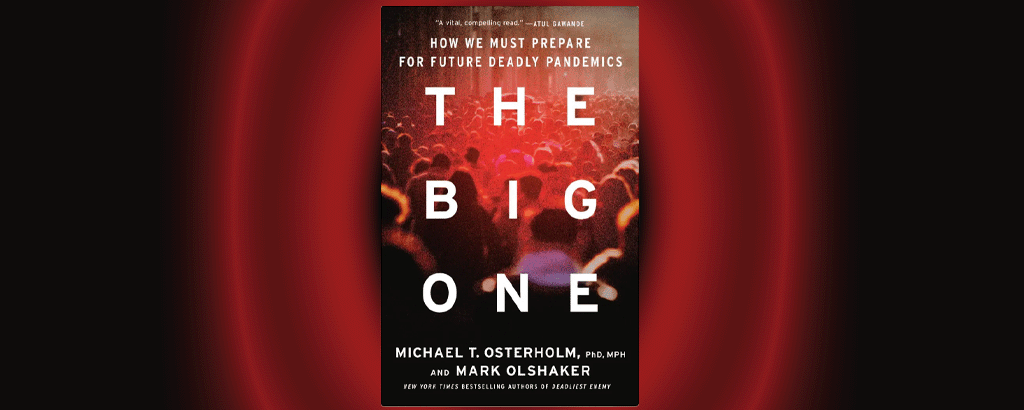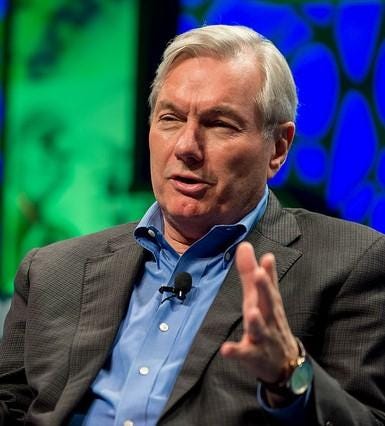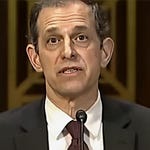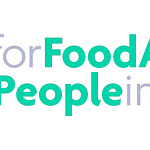Ralph welcomes infectious disease expert Dr. Michael Osterholm to discuss his new book “The Big One: How We Must Prepare for Future Deadly Pandemics.” Then, Ralph shares some quick takes on current events.
Dr. Michael Osterholm is a professor and director of the Center for Infectious Disease Research and Policy at the University of Minnesota. In November 2020, Dr. Osterholm was appointed to President-elect Joe Biden’s 13-member Transition COVID-19 Advisory Board. He is the author of Deadliest Enemy: Our War Against Killer Germs, and he has a weekly podcast called The Osterholm Update which offers discussion and analysis on the latest infectious disease developments. His latest book (co-authored with Mark Olshaker) is The Big One: How We Must Prepare for Future Deadly Pandemics.
What we’re concerned about now is we’re primed for an influenza pandemic someday where a new influenza virus will emerge. And when it takes off, it’ll rapidly spread through the people. And wherever it came from (whether a bird species or another animal) will not be that important because now it’s transmitted among humans.
Dr. Michael Osterholm
I want to be really clear about one thing: There will be an influenza virus that will cause a pandemic in the future. And the pandemic clock is ticking, we just don’t know what time it is.
Dr. Michael Osterholm
Instead of building from a base of modest preparedness from the prior administration (and I emphasize “modest”), they’re going backwards. Also, with quackery positions on a whole variety of issues that is dividing the population, feeding the misinformation on the internet, and general chaos of information transmission.
Ralph Nader
I will just make one prediction here today: There is going to be a large, huge, overwhelming crisis that is going to occur eventually around an infectious disease issue in this country. And it’s going to happen because Mother Nature herself does that to us—just like hurricanes are not optional, these large outbreaks are not optional. What’s optional is how well we respond to them and limit their impact. And we are at a point right now where we have very, very limited impact on these things. So I think the public needs to be aware, we’re in a very different setting today for public health response to a crisis than we’ve ever been in my 50 years in the business.
Dr. Michael Osterholm
News 10/31/25
Our top stories this week concern U.S. saber rattling in Venezuela. First, a new piece in published Drop Site news, coauthored by Ryan Grim, Jack Poulson and Saagar Enjeti of Breaking Points, takes readers “Inside Marco Rubio’s Push for Regime Change in Venezuela.” This piece deconstructs the Trump administration claims tying the Maduro government to fentanyl trafficking, quoting a senior U.S. official who unequivocally states that “U.S. intelligence has assessed that little to none of the fentanyl trafficked to the United States is being produced in Venezuela.” Another key point is that the Maduro government apparently offered to turn over oil resources to the United States in exchange for cessation of hostilities. Instead, in an echo of the Iraq War, Trump has apparently been, “swayed by arguments from Rubio that the best way to secure Venezuela’s oil reserves was to facilitate regime change in Venezuela and make a better deal with a new government.” As with Iraq, regime change in Venezuela is likely to end up with a chaotic power vacuum in the country, destabilizing Latin America in turn. One would have hoped the U.S. had learned its lesson. Apparently not.
The administration does however seem to favor covert schemes to oust Maduro as opposed to an outright U.S. invasion. Back in 2020, the Trump administration backed Operation Gideon, which utilized American mercenaries and Venezuelan dissidents to try to capture Maduro. This week, Venezuela claims to have foiled another such attempt. Democracy Now! reports “Venezuelan officials say they’ve captured a group of mercenaries tied to the [CIA]. In a statement, the government of Venezuela said, ‘This is a colonial operation of military aggression that seeks to turn the Caribbean into a space for lethal violence and US imperial domination.’” This report goes on to state, “Earlier this month, President Trump acknowledged that he authorized the CIA to secretly conduct operations in Venezuela.” Meanwhile AP reports that over the past 16 months, a now-retired federal agent named Edwin Lopez sought to turn Maduro’s personal pilot – Venezuelan General Bitner Villegas – and have the aviator deliver Maduro into U.S. custody. In exchange, Lopez promised to make the pilot a “very rich man.” This plot, hatched under President Biden and continuing under Trump, ultimately failed. Yet, as these half-baked covert ops go up in flames, it seems increasingly likely that the administration will resort to brute force. That same Democracy Now! piece reports that on Sunday, a U.S. warship arrived in Trinidad and Tobago. With no diplomatic solution on the horizon, it seems only a matter of time before the shelling begins.
As all of this unfolds, Congressional Republicans are shirking their oversight responsibilities. On October 23rd, Axios reported that Senate Foreign Relations Chairman Jim Risch of Idaho said the committee will not hold hearings regarding the lawless strikes on Venezuelan boats “at this time,” adding that he has been “briefed on it and feel[s] comfortable with where we are.” As if mocking the Legislative Branch, that same day Semafor reported a quote from “a person close to the White House” who said Trump won’t coordinate with Congress until “Maduro’s corpse is in US custody.”
Turning to the federal government, reclusive billionaire Timothy Mellon, heir to the Mellon fortune, has donated $130 million to the Pentagon to offset military staff salaries during the government shutdown. While $130 million is a drop in the bucket for the American Military-Industrial Complex – this donation will amount to about $50 per troop this pay cycle – it would appear to be blatantly illegal under the Antideficiency Act. The Hill explains that under this statute, “federal agencies are barred from ‘obligating or expending federal funds in advance or in excess of an appropriation, and from accepting voluntary services.’” In part, this statute was adopted to avoid just such a scenario – the president circumventing the Congressional Power of the Purse by soliciting outside donations. Unfortunately, Trump’s subservient Congressional allies are unlikely to do anything about this outrageous usurpation of their power.
On the regulatory side, the Trump administration is putting its thumb on the scales in favor of David Ellison’s bid to acquire Warner Bros. Discovery. A New York Post report quotes a senior administration official who says “Who owns Warner Bros. Discovery is very important to the administration…The Warner board needs to think very seriously not just on the price competition but which player in the suitor pool has been successful getting a deal done.” The Post adds that “rival bidders are likely to face stiff hurdles from US regulators.” Ellison, son of Trump billionaire ally Larry Ellison, has had his eye on Warner Bros. Discovery – which owns CNN – since his recent acquisition of Paramount and its subsidiary CBS News. Critics have long warned of the dangers of consolidation in the media sphere, particularly news, but this would truly be an unprecedented upset of the media landscape.
Turning to consumer news, a new article in the Lever focuses on the fast food chain Shake Shack. According to this piece, the chain, “recently updated its terms of use agreement to include a binding arbitration agreement and class-action waiver denying customers their legal right to take companies to court.” Now, corporations sneaking binding arbitration agreements into their terms of service is not a new phenomenon, but this method is novel. This article explains that Shake Shack, and other fast food chains, are “extending restrictive contracts to consumers through the rapid expansion of online services such as websites, mobile apps, and automated self-service kiosks.” In other words, these automated services are becoming a ‘triple-threat’ for these companies to exploit, simultaneously cutting labor costs, harvesting consumer data, and now forcing customers into these restrictive legal agreements. When will regulators take action to protect consumers from such rampant abuse?
One bright spot, so to speak, for consumer protection is emerging in the United Kingdom. The BBC reports the British Department for Transport will begin a review of the increasingly bright, bordering on blinding, LED headlights that have become commonplace in automobiles. The new guidelines are to be unveiled in the forthcoming Road Safety Strategy document being prepared by the government. Many drivers in the United States have complained about this issue as well – noting how dangerous it is for drivers to be blinded by oncoming headlights while on the road – and certain states like Hawaii and Massachusetts have taken action, though there has yet to be a federal response.
In more positive news from abroad, the Economic Times reports China has enacted an anti-misinformation law dictating that, “if you are an influencer and… want to discuss ‘serious’ topics - such as finance, health, medicine, law or education - you must provide proof of relevant professional credentials.” This law will also ban “advertising for medical products and services,” which also covers supplements and health foods. Other reports indicate that the fines for violating this law could be as high as ¥100,000. The proliferation of medical misinformation has become a major issue for governments the world over and in the U.S. has incubated a vast underworld of medical conspiracy theories and dubious health products. It is heartening to see something being done to protect consumers’ health and safety.
Speaking of someone doing something, Democratic congressional candidate Kat Abughazaleh made headlines a month ago for blocking vehicles outside of an ICE facility in Broadview, Illinois, where she is running for office. Now, NBC reports she has been indicted by a special federal grand jury, “alongside five other people, including two other political candidates.” Abughazaleh responded to the indictment, writing “This political prosecution is an attack on all of our First Amendment rights. I’m not backing down, and we’re going to win.” Her lawyer, Josh Herman, added, “This is a political prosecution that tries to turn dissent and First Amendment opposition to the Trump administration’s cruel policies into a conspiracy…Kat has steadfastly opposed those policies and she will fight these charges with the same principled determination.” The defendants have not been arrested but will surrender to the court next week.
Finally, Palestine Legal has scored a major victory. The group reports that “The First Circuit…[has] ruled that pro-Palestinian slogans, encampments and criticism of Zionism is protected by the First Amendment -- tossing out a Zionist complaint targeting pro-Palestinian organizing at @MIT.” Furthermore, the court found that “Slogans such as From the river to the sea, Palestine will be free, intifada revolution, and calling Israel’s actions a genocide -- and more -- do not target Jewish or Israeli students on the basis of their identity… but target Israel over its treatment of Palestinians.” This is a win for the David side of the David and Goliath struggle between pro-Palestine student groups and the universities where they are organizing – which are themselves under immense pressure from the Trump administration to stifle pro-Palestinian speech. Hopefully, this gives organizers the necessary breathing room they need to regroup as the Trump-brokered ceasefire grows ever shakier.
This has been Francesco DeSantis, with In Case You Haven’t Heard.













